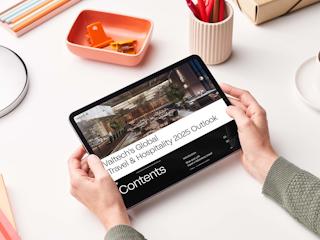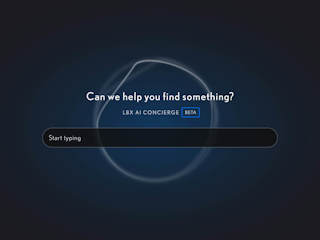There's no question that 2020 was a year like no other
Our personal and professional lives were turned upside down but, as we settled into the new normal, we adopted new behaviours, a lot of us created a new set of personal and professional priorities and, for most of us, I think it’s safe to say that these are going to be hard to let go of when the pandemic is over. In fact, I don’t think we are going to have to let them go. The new normal is quickly becoming … well, the norm and unrecognisable from this time last year.
I have never really been a person that makes new year’s resolutions; however, in the spirit of taking the best from 2020, this year is different. My new year’s resolution for 2021 is to make sure I continue with the positive effects the pandemic has had on my personal and professional life.
Similarly, a lot of businesses are going to be emerging from the pandemic unrecognisable from their former selves. New and innovative operating models and ways of working have been realised, platforms delivered at a pace that would have previously been seen as unachievable and the social and economic impact of the pandemic has given some businesses an entirely new purpose.
With that in mind I thought it would be interesting to ask some of our experts here at Valtech, what are the learnings we can take from 2020 and what are resolutions they will be taking into 2021 – or more the resolutions they will be recommending our clients should be making.
One of the most dominant effects the pandemic had was undoubtedly in the world of digital commerce. Redesigning entire architectures, supporting the development of manufactures direct to consumer (D2C) models and improving order management systems are all challenges our commerce team have been tackling head on over the last 12 months.
I asked Christoph Kipp, our Global VP Commerce, for his resolutions.
For me there are 3 clear learnings from 2020 where I believe that businesses need to resolve to address and focus on in 2021.
The first, and I don’t think this will come as a surprise to many, but 2021 needs to be the year where all businesses take digital commerce really (really) seriously.
If there is one thing COVID has taught us – it’s the critical importance of digital as a sales channel. The pandemic has had a lasting impact on consumer behaviour and dramatically accelerated the shift towards digital sales.
So, 2021 should be the year you invest aggressively in the maturity of your digital sales capabilities to be better prepared for the future – for many retailer’s ecommerce has become their only lifeline during national lockdowns and many businesses, I am afraid to say, have paid a hefty price for being digital laggards.
Linked to this first resolution is my second – Improve the flexibility of your fulfilment processes.
Unused inventory sitting in brick and mortar stores while it’s going out of fashion, unable to support click&collect orders, returned goods are shredded because it’s cheaper than restocking them, no home-delivery, unable to do cross-border shipping, warehouse overwhelmed by ecommerce orders, finance manually processing refunds. Sound familiar?
2021 will be the year of fulfilment process flexibility. Specifically look at improving your order-management and cross channel capabilities and make sure your processes can scale up and down quickly. Look at introducing an OMS and increase the depth and flexibility of integration in your digital ecosystem (ecommerce, ERP, CRM, POS, WMS), for example by introducing a SaaS middleware that will give you more flexibility to support additional integration scenarios required by new processes.
And my final resolution would be, no matter who they are, get to know your (end-)customers and focus everything you do around them.
Knowing you customers’ needs, preferences, problems and pet-peeves is essential in world of increasingly personalized product offerings and marketing. Many businesses however are still in the stone-ages of CRM or, there are many manufacturers who do not know anything about the actual consumers of their products while others are still collecting huge piles of data but fail to get even the simplest insights from it.
So, make 2021 the year where you start collecting, structuring and using customer data in a systematic fashion. Revisit the data points you need to collect for which purpose and insight, break down data-silos, make data and insights available to your sales and marketing teams and personalize your marketing and sales offerings. Clean-up and integrate your CRM into the digital landscape, introduce personalization and continuously improve based on data-driven insights. Especially if you are a manufacturer, consider introducing a direct-to-consumer channel or find other ways to directly engage with the end-customer.”

Needless to say, its simply not enough to “build it and they will come.” Christoph has outlined the importance of really understanding your end customers by having a methodical approach to integrating the data their behaviour creates to glean insight and act upon it. Of course, this data should also be used to fuel your marketing initiatives. Delivering personalised experiences, and doing so at scale, is not new news. However, 2021 is going to be the year where we will be increasing focus on privacy, and privacy by design is a key concern in any CDO and digital marketeers reality – despite having more and more customer data technology available.
Line Huusom, Account Director in our Marketing Service team shares her insight and resolutions on this.
Cookie-deprivation acts and EU GDPR legislation poses significant challenges to succeeding with cookie-based personalized push marketing and connected eco-systems, which has been one of the primary objectives for CMOs over the last couple of years. It also drastically changes the reporting and insights from analytics which is the very foundation for data-driven initiatives.
Adtech companies like Google are looking into working with clusters of similar but anonymized behavior (fueled by AI) instead of individual cookie-based data in order to continue to work with targeted communication (also called FLoC).
So, my first resolution would be to make 2021 the year you respond appropriately to your users’ privacy requests and consider it to be a fundamental part of your CX design.
User expectations will change even more over time with regards to privacy. People “opting in” will increasingly expect services to be individual and personalized while those who do not will expect companies to respect their choice for privacy. This is going to most likely also result in an increase in permission hunting so the second resolution from me, and linked to what Christoph has already discussed, is to:
Make 2021 the year you really focus and optimize the CX with relevant content and services.
Research has proven the value of an improved CX, but it needs to be done with a purpose and not just keeping customer data for the record - in order to have those desired effects.
Lastly, in 2021 we expect to see a shift back to broader and brand-based digital push communications – with clear brand focused messaging and value propositions that can resonate with broader audiences. If this is the case, then businesses will really need to focus even more on differentiation and making the brand relatable. The difference is the new ways of doing this with new digital formats and technologies that have emerged over the last 12 months, which can increase the brand effects manyfold.
Which leads me to my final resolution for 2021 – from amongst the need to address your user experience, ensuring the data flows are providing personalized experience and content at scale: Don’t lose sight of the importance that all of this has on your brand.

Does all of this mean that the real-world we live in is doomed? Are we actually accessories to the murder of the high street and bricks and mortar real estate?
I posed this to Jeremy Duimstra, Senior Vice President, Connected Experiences here at Valtech.
Absolutely not. Customers are going to come back to physical locations in droves. I think the question businesses need to ask themselves is ‘are we ready’?
Our Connected Experience practice focuses on areas where digital touches physical spaces, and I think it is essential for businesses to use the next few months to get ready and prepare themselves for people to come back to the places they love once the pandemic is behind us. And they will come back – but their expectations of the experience will have changed.
The most successful companies are going to be the ones that take this time to innovate around the customer journey so that it is completely seamless, frictionless and, most importantly, fun at each customer touch point.
Discussing this with some of our clients, a jumping off point for us to re-imagine how the physical store can react to you, not how you react to the store.
A key area for innovation, and a New Year’s Resolution that we want to take to 2021 is that Physical spaces should react to the data around them.
If there is rain in the forecast, a retailer’s store software should suggest moving foul weather gear to the most trafficked part of their store. If a theme park is noticing a surge of people in one location of the park, they should use data to move people to attractions that are less crowded. If a traveller walks into your resort, you should know everything about that person’s preferences to tailor their room and activities.
These are exciting times. The physical world is swimming with data that we can aggregate with APIs. AI can help us crunch this data into usable insights while Sensors and IoT let us know what is happening in the spaces we live in to adjust them to our liking. The digital layer that interfaces with our physical world will enable experiences that seem like science fiction.
Let’s use this New Year to resolve to innovate the technology we have available to us so that we can genuinely improve people’s experience of the physical world that we all can’t wait to return to.”
In order to deliver the experiences that Jeremy described businesses need to be ready, operationally and culturally, to innovate. Ensuring there is a proactive culture and that decisions are made quickly has been crucial during the COVID-19 pandemic. Retailers with a mindset of test, learn and move forward with a minimal viable product have been key to the acceleration of digital over the last year.

Dirk Lassig, Director of Transformation Consulting elaborates and provides his resolutions for 2021.
Covid and on-going digitalization has moved consumers' buying and consumption context increasingly to their home. Existing brand and commerce experiences have not always been optimized for home use or delivery and therefore lose out to alternatives.
Peloton, for example, is off to the races because they do not cater to gyms but bring the gym to your home and have a great subscription service that matches diverse at-home schedules. With this in mind:
Our first resolution should be for businesses to review if they are still truly customer-centric and if they are not, resolve to fix it.
A great starting point for 2021 is to ask yourself, how much of your existing target customer journey can you shift to an in-home experience?
If you don't sell a commodity product, a non-intermediated direct-to-consumer experience gives you the best chance to create a great end-to-end brand experience. But is it financially and operationally feasible to compete with existing platforms like Amazon? They set a costly bar for distribution and returns. Reconsider where to focus to create a memorable "explore, shop and use at-home" experience.
Of course, as well as shopping and taking brand experiences in-home, the pandemic has also made most of us work from home and forced business and employees to create new remote working capabilities.
For my second resolution, I think a question we all need to ask is; when the lockdowns are released, how can these new capabilities be combined with co-location and how will that impact the way we do business?
Offices will be redesigned to meet new expectations that have been unlocked by remote working capabilities. But it is not only about the space, it is also about how we connect, how we do our work and how that impacts our business.
Over the course of 2021, the traditional relationship between employer and employee will continue to change as individual freedoms increase and work life balance, working schedules and behaviours will be redefined as we understand that “outcome beats output.”
This could eventually result in companies working within a worldwide network, united by a shared sense of purpose. Giving them the tools, the connections and the freedom to focus on the outcomes in an asynchronous way. In short, transforming where you do your work will impact the way you do your work, how you connect and how you contribute. An incredible transformation to come out of the pandemic.
Finally, let's make 2021 the year you find a true meaningful purpose to navigate your business transformational goals.
Your organisation should find a purpose that has a meaning for consumers and employees. It creates the why they consume your products or why they choose to be part of your organisation and support its growth.
However, a word of caution. If it becomes disingenuous and superficial it will have the adverse effect. Your purpose influences your brand's message and the why - how you do business with your customers, how you transact, the support you offer and the experience you give them. A purpose that’s engrained into your business’s DNA will fundamentally change your marketing communication and the innovation thesis for your new products and services. At its core, it gives guidance towards a compelling future for your business transformation.”
We are ready for what 2021 has to bring. Here’s to a happier, healthier and more exciting year ahead.











